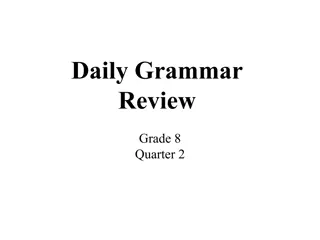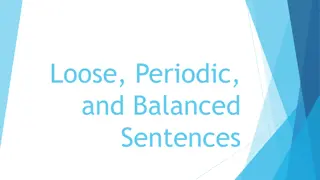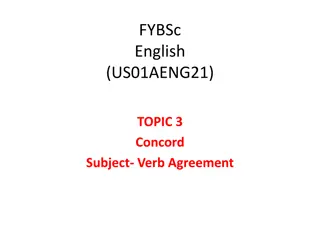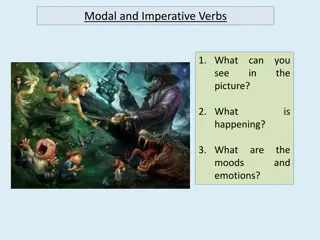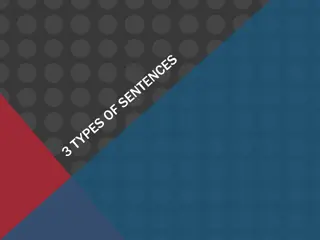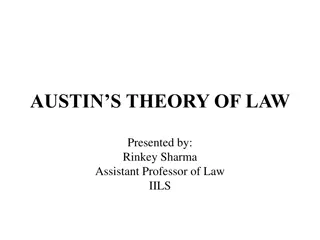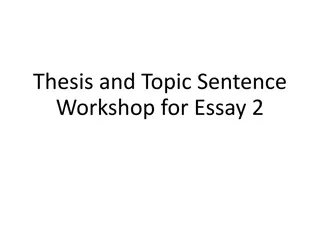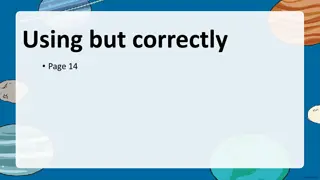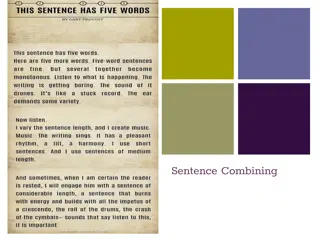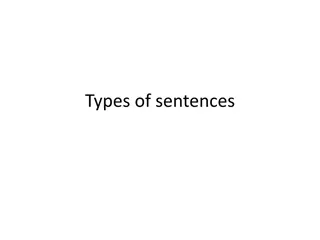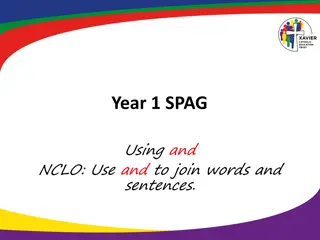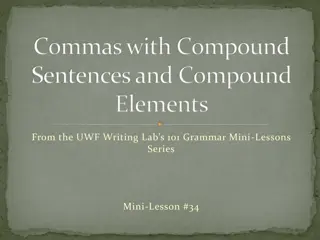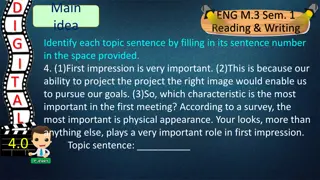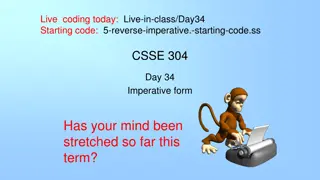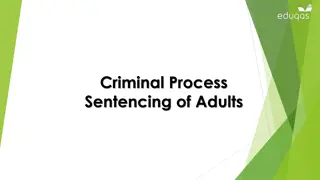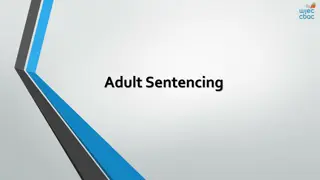Addressing Syphilis Resurgence: A Public Health Imperative
Syphilis has reemerged as a critical global public health concern, with alarming rates of new cases reported worldwide. The webinar by Dr. Christian McGrath sheds light on the resurgence of syphilis, its impact on various regions including Australia and Victoria, and outlines key strategies for publ
0 views • 20 slides
Daily Grammar Review Challenges for Grade 8 Students
Engage in a week-by-week grammar review for 8th-grade students. The lessons consist of identifying declarative or interrogative sentences, punctuating sentences with periods or question marks, and distinguishing between exclamatory and imperative sentences. Enhance your grammar skills with daily exe
1 views • 61 slides
Understanding Predicators and Predicates in Sentence Semantics
Exploring the semantics of sentences, this content delves into the structure of declarative sentences in terms of predicators and arguments. It discusses various classes of items that can function as the predicator of a sentence, such as lexical verbs, the copulative verb "be" in equative sentences,
1 views • 39 slides
Understanding Loose, Periodic, and Balanced Sentences
Explore the definitions, rhetorical purposes, and examples of loose, periodic, and balanced sentences. Understand how these sentence structures impact readability and communication. Learn to differentiate between loose sentences with the main point at the beginning and periodic sentences with the ma
0 views • 18 slides
Pronoun Placement Rules in Spanish Sentences
Clear up confusion around the placement of reflexive, direct object, and indirect object pronouns in Spanish sentences and commands. Learn the placement rules for different types of pronouns in statements and commands, including examples for single-verb and two-verb sentences. Understand the order o
2 views • 10 slides
Understanding Subject-Verb Agreement in English Sentences
Subject-verb agreement is crucial in English grammar to ensure sentences are grammatically correct. The subject of a sentence must agree with the verb in terms of gender, number, person, and case. Incorrect use of verb can lead to ungrammatical sentences. Learn how the subject and verb should match
0 views • 28 slides
Understanding English Imperative Sentences
English imperative sentences function as directives or commands, characterized by having no overt subject noun phrase, using an implicit second-person pronoun (you) as the subject, being tenseless with the base form of the verb, always indicating future actions, and not occurring in subordinate clau
1 views • 22 slides
Understanding Modal and Imperative Verbs: Usage and Examples
This content covers the explanation and examples of modal verbs, which express certainty, possibility, and obligation, as well as imperative verbs that denote commands and orders. Learn to identify and use these verb types accurately and creatively through practical examples and engaging activities.
1 views • 12 slides
Understanding Types of Sentences in English Grammar
Simple, compound, and complex sentences are fundamental components of English grammar. Simple sentences express a single complete thought, compound sentences combine two independent clauses with a conjunction, and complex sentences consist of an independent clause and one or more dependent clauses.
2 views • 12 slides
Understanding Completing Sentences in English Grammar for Classes 9-10
Delve into the concept of completing sentences with Assistant Teacher Z.M. Akhtarul Kabir from Wazuddin High School. Learn the definition, rules, and examples of completing sentences with various tenses like present indefinite, past indefinite, and past perfect. Enhance your grammar skills and abili
0 views • 17 slides
English Class Column Matching Practice for Learning Complete Sentences
In this English class practice session, students will learn to match parts of sentences to create complete sentences. The practice involves columns A, B, and C with sentences focusing on education, wisdom, moon and sun relationships, and national flag symbolism. By the end of the lesson, students wi
0 views • 21 slides
Understanding Different Types of Sentences
Learn about the four types of sentences - Assertive, Imperative, Interrogative, and Exclamatory. Understand their characteristics and see examples to identify each type correctly. Enhance your knowledge of sentence structure and punctuation rules.
0 views • 8 slides
Austin's Theory of Law in Jurisprudence
Austin's Imperative Theory of Law, presented by Assistant Professor Rinkey Sharma, delves into the foundational concepts of English jurisprudence as formulated by Austin. His work categorizes jurisprudence into general and particular aspects, exploring principles common to various legal systems and
0 views • 11 slides
Crafting Effective Topic Sentences for Academic Essays
Understanding the importance of topic sentences in academic writing is crucial for creating cohesive and well-structured essays. This workshop explores the role of topic sentences in connecting paragraphs to the thesis statement, providing examples and guidance on how to craft effective topic senten
0 views • 7 slides
Understanding Sentence Structure: Simple and Compound Sentences Explained
Learn about the characteristics of simple and compound sentences with examples. Understand how to use conjunctions like "and" and "but" to connect ideas in sentences. Practice creating sentences using these structures and improve your writing skills.
0 views • 12 slides
Understanding Sentence Structure: Phrases, Clauses, and Compound Sentences
Learn about phrases, clauses, simple sentences, conjunctions, and compound sentences in English grammar. Understand the differences between independent and dependent clauses, how to form compound sentences using conjunctions, and practice writing sentences about Justin Bieber. Explore the components
1 views • 21 slides
Understanding the Four Types of Sentences
Declarative, imperative, interrogative, and exclamatory sentences each serve a unique purpose in communication. Declarative sentences state facts, imperatives give commands, interrogatives ask questions, and exclamatory sentences express strong emotions. By recognizing the characteristics of each ty
0 views • 18 slides
Fun with Connecting Words: Using 'And' to Join Sentences
Explore the concept of using the word "and" to join words and sentences together. Practice joining phrases, sentences, and creating silly sentences. Engage in activities to understand sentence structure and enhance language skills.
0 views • 10 slides
Fun with Writing: Simple Sentences and Wow Words Exploration
Explore the fundamentals of writing with simple sentences and enhancing vocabulary using wow words. Learn how to construct sentences, identify parts of speech, and make your writing more engaging through descriptive language. Practice by creating your own sentences and incorporating new vocabulary.
0 views • 12 slides
Rules for Changing Imperative Sentences in Reported Speech
Learn the rules for changing imperative sentences in reported speech with examples. Discover how to transform direct commands into indirect requests, advice, or orders. Understand the structure of reported speech when addressing a person. Explore how to add respect when "Sir" is present in the repor
0 views • 14 slides
Understanding Structurally Sentences: Simple, Compound, and Complex
Learn about structurally sentences - simple, compound, and complex. Understand the different sentence types, learn to make sentences using these structures, and explore the use of coordinating and subordinating conjunctions. Enhance your skills in changing sentence structures and grasp the essence o
0 views • 19 slides
Understanding Sentence Structure: Simple, Compound, and Complex Sentences
Explore the basics of sentence structure through simple sentences with one independent clause, compound sentences containing multiple independent clauses, sentence fragments, and complex sentences combining an independent clause with a dependent clause. Examples and guided practice included.
0 views • 22 slides
Mastering Commas in Compound Sentences
Learn how to effectively use commas in compound sentences and compound elements. Discover when to include commas before coordinating conjunctions that separate complete sentences and when it's appropriate to leave them out for short sentences. Understand when not to use commas when coordinating conj
0 views • 4 slides
Mastering Transformation of Sentences in English Classroom
Explore the four essential steps to transform sentences - from assertive and interrogative to imperative and exclamatory. Learn about sentence types like simple, complex, and compound along with active and passive voices. Practice converting sentences through examples provided by Assistant Teacher J
0 views • 13 slides
Evolution of Life Sentences: From Parole to Perpetual Confinement
The shift in the interpretation and implementation of life sentences in the US, particularly regarding life without parole (LWOP), has seen a transformation from a system emphasizing rehabilitation and potential release to one focused on retribution and incapacitation. This transition has led to the
0 views • 11 slides
Understanding Topic Sentences in Writing
Topic sentences are vital in writing as they introduce the main idea of a paragraph and provide a clear focus. They must be complete sentences, not questions, facts, or incomplete thoughts. This presentation explores the characteristics of topic sentences and their importance in composing well-struc
0 views • 19 slides
Understanding the Importance of Topic Sentences in Reading and Writing
Effective topic sentences are crucial in conveying the main idea of a paragraph. This exercise highlights the significance of topic sentences in various contexts, including first impressions, criminal justice, and product marketing. By identifying and analyzing topic sentences, readers can better co
0 views • 19 slides
Transforming Complex Sentences to Simple Sentences - Lesson Overview
In this lesson, students will learn how to transform complex sentences to simple sentences in English grammar. The lesson covers the structure of complex sentences using conjunctions like "Though" and "Although" and guides students on converting them into simple sentences with expressions like "In s
0 views • 12 slides
Understanding Types of Sentences in English Grammar
Types of sentences in English grammar include clauses - independent and dependent. Independent clauses stand alone, expressing complete thoughts, while dependent clauses rely on independent clauses. Different types of sentences include simple, compound, complex, and compound/complex sentences. Simpl
0 views • 41 slides
Understanding the Imperative Mood in Language
The imperative mood focuses on giving commands without reference to different time frames. It entails direct statements with the understood recipient mainly being 'you.' Commands in the singular, informal form involve dropping the 's' from the second person singular verb, both in affirmative and neg
0 views • 19 slides
Understanding the Four Types of Sentences
Learn about the four types of sentences: declarative, interrogative, imperative, and exclamatory. Understand the differences between sentences and fragments, and see examples of each type in practice. Discover how to identify and use these different types of sentences effectively.
0 views • 9 slides
Exploring Computer Programming Principles
Dive into the world of computer programming, covering high-level and machine languages, compilers, interpreters, writing programs, top-down design, and the array of programming languages available. Understand the essentials of building code to control computers, the diversity of programming language
0 views • 23 slides
The Jan-San Omnichannel Imperative Executive Conference Highlights
Explore the key discussions of The Jan-San Omnichannel Imperative Executive Conference, focusing on paradigm shifts in digital value creation, Amazon business strategies, and channel model innovations. Delve into back-casting for forward innovation, omnichannel imperatives for B2B end-users, and env
0 views • 28 slides
Grammar on the Go! Unit 5 Lesson 7 Sentence Corrections & Clauses
This content focuses on sentence corrections in red, defining vocabulary words, and understanding different types of sentences such as compound, complex, simple, and compound/complex. It also covers identifying sentence types like declarative, imperative, interrogative, and exclamatory. Additionally
0 views • 9 slides
Understanding Imperative Form in Scheme Programming
Delve into the world of imperative programming in Scheme, exploring the boundaries of C or Assembly Language resemblance. Discover how Scheme can serve as a robust language for interpreter implementation and contemplate if a simpler language without first-class procedures would suffice for Assignmen
0 views • 18 slides
Mastering Narration: Changing Reported Speech Types
In this English lesson for Class Nine students, the topic of Narration Part 3 focuses on changing the reported speech when it is imperative, optative, or exclamatory. Learning outcomes include the ability to transform such speeches effectively. The lesson covers rules for imperative reported speech,
0 views • 22 slides
Overview of Adult Sentencing in Criminal Justice
Adult sentencing in criminal justice involves four main categories of sentences available to the court: custodial sentences, community sentences, fines, and discharges. Custodial sentences for adults can range from weekend prison to life imprisonment, with mandatory life sentences for certain seriou
0 views • 21 slides
Understanding Adult Sentencing and Custodial Sentences
Adult sentencing involves 4 main categories of sentences: Custodial sentences (including mandatory life sentences), Community sentences, Fines, and Discharges. Custodial sentences for adult offenders can vary in duration from weekend prison to whole life imprisonment, with some offenses mandating a
0 views • 24 slides
Tackling the Awkward Squad in Functional Programming
Functional programming is known for its beauty in concise abstractions and high-order functions, but it often struggles with managing the "Awkward Squad" of input/output, imperative state, and error handling. The Direct Approach involves dealing with side effects and imperatives directly but can lea
0 views • 43 slides
Understanding State, Mutability, and Heaps in Programming
Explore the concepts of (im)mutability, imperative vs. functional programming, referential transparency, and challenges for strict immutability in programming. Learn about the differences between imperative and functional languages, the benefits of referential transparency, and the challenges of mai
0 views • 46 slides

